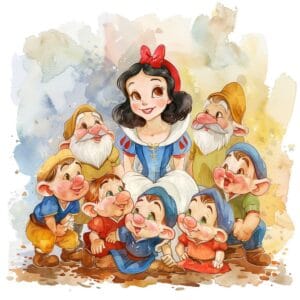“Yes, this is a song for very small children!” declared Aunt Malle. “As much as I should like to, I cannot follow this ‘Dance, Dance, Doll of Mine!'”
Continue readingTag: Traditional fairy tales
Traditional fairy tales, these are beautiful tales that have been loved by children and their parents for hundreds of years. Perhaps the language has been dusted off a little, but Hansel always steals the gingerbread and Snow White always gets a kiss from the prince. A good ending is also traditional in fairy tales!

Godfather’s picture book
Godfather could tell stories, so many of them and such long ones, and he could cut out paper figures and draw pictures. When it was nearly Christmas he would bring out a scrapbook with clean white pages, and on these he pasted pictures cut out of books and newspapers; and if there weren’t enough for the story he was going to tell, he drew them himself. When I was a little boy I got several of these picture books, but the prettiest of them all was the one from “that memorable year when gas replaced the old oil lamps in Copenhagen” – and that was the inscription written on the first page.
Continue readingThe snowdrop
It was winter-time; the air was cold, the wind was sharp, but within the closed doors it was warm and comfortable, and within the closed door lay the flower; it lay in the bulb under the snow-covered earth.
Continue readingTwelve by the mail
It was very frosty, starry clear weather, quiet and calm.
Continue readingThe races
A prize, or rather two prizes, a great one and a small one, had been awarded for the greatest swiftness in running,– not in a single race, but for the whole year.
Continue readingAt the uttermost parts of the sea
A couple of large ships were sent up toward the North Pole, to discover the boundaries of land and sea and how far it would be possible for the human race to penetrate in that direction.
Continue readingThe loveliest rose in the world
There lived once a great queen, in whose garden were found at all seasons the most splendid flowers, and from every land in the world.
Continue readingThe darning-needle
There was once a darning-needle who thought herself so fine that she fancied she must be fit for embroidery. “Hold me tight,” she would say to the fingers, when they took her up, “don’t let me fall; if you do I shall never be found again, I am so very fine.”
Continue readingOle-Luk-Oie, the Dream-God
There is nobody in the world who knows so many stories as Ole-Luk-Oie, or who can relate them so nicely. In the evening, while the children are seated at the table or in their little chairs, he comes up the stairs very softly, for he walks in his socks, then he opens the doors without the slightest noise, and throws a small quantity of very fine dust in their eyes, just enough to prevent them from keeping them open, and so they do not see him.
Continue readingLittle Claus and big Claus
In a village there once lived two men who had the same name. They were both called Claus. One of them had four horses, but the other had only one; so to distinguish them, people called the owner of the four horses, “Great Claus,” and he who had only one, “Little Claus.” Now we shall hear what happened to them, for this is a true story.
Continue reading